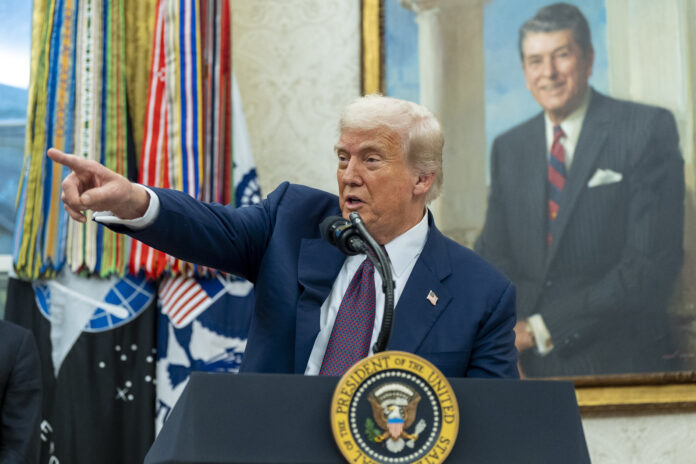- Trump’s new tariffs on over 60 countries have gone into effect, with rates as high as 50% on nations deemed to have unfair trade practices.
- Key targets include Brazil, India, and Canada, while countries like Mexico and China received temporary extensions to finalize trade deals.
- Americans face rising prices on everyday items like food, clothing, and electronics. Meanwhile, businesses warn they can’t absorb tariff costs much longer.
At the stroke of midnight, President Donald Trump’s long-threatened global tariff blitz becomes reality. After 18 weeks of tense negotiations and shifting deadlines, the administration is moving forward with massive new import taxes targeting over 60 countries. These actions trigger what critics are calling a “tariff doomsday” for American consumers.
Tariffs now range up to 50 percent on goods from countries deemed to have unfair trade practices. The impact is expected to hit home quickly—at the grocery store, the car dealership, and the electronics aisle.
Brazil, India, and Canada Among Top Targets
The final wave of tariffs includes steep penalties on major trading partners, including Brazil and India. Brazil was hit with a 50 percent tariff on most goods after President Luiz Inácio Lula da Silva rejected U.S. demands to end the prosecution of former leader Jair Bolsonaro, who remains a Trump ally. While a handful of key Brazilian exports—like orange juice, fertilizer, and wood pulp—were spared, everyday staples like beef and coffee were not spared.
India, meanwhile, now faces a second round of 25 percent tariffs, effective August 27. This is on top of the identical levy already in place since August 1. Trump pointed to India’s continued purchases of Russian oil as the reason. He accused the country of “fueling the war machine” of Vladimir Putin.
Canada didn’t escape unscathed either. While products covered under the USMCA agreement remain exempt, a sweeping 35 percent tariff now applies to many other imports from America’s northern neighbor.
Mexico was granted a 90-day extension to hammer out a deal, buying its officials a little more time.
Dozens of Countries Still Out in the Cold
The list of countries now on the wrong side of U.S. trade policy includes a wide swath of the globe. Nations like Switzerland, Turkey, Nigeria, South Africa, Ecuador, Cambodia, and even close allies like New Zealand and Norway are facing penalties. These will remain unless new trade deals are reached.
Hardline nations like North Korea, Iran, and Russia were already under separate economic restrictions. However, the tariffs add further strain to already-tense relations.
Trade Wins with Europe, UK, and Japan Soften the Blow
While some doors are closing, others are cracking open. The White House scored notable wins in July, finalizing trade agreements with both the United Kingdom and the European Union. Trump praised the deals as major economic victories, touting billions in promised investments.
Earlier in the summer, a $550 billion trade deal with Japan also made headlines. This marked a rare moment of unity amid escalating tensions with other nations.
China, the United States’ biggest trading rival, was granted a temporary reprieve. Talks were extended through August 12 following encouraging progress during meetings in Stockholm.
But the list of unresolved negotiations remains long. Tariff deadlines now loom for many nations, and the administration’s aggressive approach has rattled both foreign governments and U.S. businesses.
Americans Face Rising Prices on Everyday Essentials
For ordinary Americans, the biggest concern is closer to home: their wallets. The tariffs are expected to drive up the cost of food, clothing, household goods, electronics, vehicles, and industrial materials like steel and aluminum.
While some importers have tried to absorb the extra costs to protect customers, business owners warn that strategy won’t last forever. One retail executive told reporters, “We’ve held off raising prices, but we’re nearing the breaking point.”
Even staple grocery items—such as imported fruits, coffee, and meat—could see price hikes by fall. This is especially likely as key suppliers like Brazil and India feel the squeeze.
Auto parts, appliances, smartphones, and tools are also expected to rise in cost. This particularly affects lower-income households who rely on imported goods for affordability.
Treasury Expects Record Tariff Revenue, Trump Says ‘People Love It’
Despite the backlash, the administration is celebrating the windfall. Treasury Secretary Scott Bessent revealed that the U.S. has already collected \$152 billion in tariff revenue this year. He projects that figure could reach \$300 billion by the end of December.
Trump, never one to back down from a controversial move, doubled down on the policy in an interview with CNBC. “People in the U.S. love the tariffs,” he insisted. “They love their country. And they love that foreign countries aren’t ripping us off anymore. For years they ripped us off—friend and foe. And the friend was worse.”
His remarks stirred mixed reactions online. Supporters applauded the firm stance against what they see as unfair global trade. But critics accused the president of risking economic fallout for political theater, warning that American families will bear the brunt.
More Talks or More Turmoil?
With the first wave of tariffs in place, attention now turns to countries scrambling to reach last-minute deals. The administration is giving few hints as to who might be next for exemptions. Furthermore, it remains unclear who may face even tougher penalties.
All eyes are on the extended negotiations with China and Mexico. The response from U.S. allies who feel blindsided by the sweeping measures is also being watched.
For now, Americans are left to navigate a new economic landscape—one where politics, diplomacy, and groceries are suddenly more intertwined than ever. Whether these tariffs deliver long-term gain or short-term pain remains a debate. This debate will echo all the way to the 2026 election.




